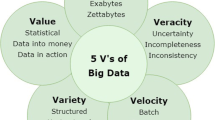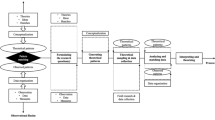Abstract
The purpose of this work is to analyse the cognitive process of the domain theories in terms of the measurement theory to develop a computational machine learning approach for implementing it. As a result, the relational data mining approach, the authors proposed in the preceding books, was improved. We present the approach as an implementation of the cognitive process as the measurement theory perceived. We analyse the cognitive process in the first part of the paper and present the theory and method of the logically most powerful empirical theory discovery in the second. The theory is based on the notion of ‘law-like’ rules, which conform to all the properties of laws of nature, namely generality, simplicity, maximum refutability and minimum number of parameters. This notion is defined for deterministic and probabilistic cases. Based on the method, the ‘discovery’ system is developed. The system was successfully applied to many practical tasks.
Similar content being viewed by others
References
Bratko I.and Muggleton,S.(1995),'Applications of Inductive Logic Programming ',Com-munications of ACM 38(11),pp.65-70.
Abu-Mostafa, Y.S.(1990),'Learning from Hints in Neural Networks ',Journal of Complexity 6,pp.192-198.
Bergadano, F., Giordana, A.,and Ponsero, S.(1989),'Deduction in Top-Down Inductive Learning ',in Proceedings of the Sixth International Workshop on Machine Learning,Ith-aca,NY: Morgan Kaufmann,pp.23-25.
Bratko,I.(1993),'Innovative Design as Learning from Examples ',in Proceedings of the International Conference on Design to Manufacture in Modern Industries,Bled,Slovenia, June 1993.
Bratko,I., Muggleton, S.,and Varvsek,A.(1992),'Learning Qualitative Models of Dynamic Systems ',in S. Muggleton,ed.,Inductive Logic Programming,London: Academic Press.
Carnap, R.(1962),Logical Foundations of Probability,Chicago: University of Chicago Press.
Chang, C.C.and Keisler, H.J.(1973),Model Theory,Amsterdam: North-Holland.
Cramer,D.(1998),Fundamental Statistics for Social Research,Step-by-Step Calculations and Computer Technique using SPSS for Windows,London: Routledge.
Danyluk,A.(1989),'Finding New Rules for Incomplete Theories:Explicit Biases for Induction with Contextual Information ',in Proceedings of the Sixth International Work-shop on Machine Learning,Ithaca,NY: Morgan Kaufmann,pp.34-36.
Dzeroski,S.(1996),'Inductive Logic Programming and Knowledge Discovery in Databases ', in U. Fayad, G. Piatetsky-Shapiro, P. Smyth and R. Uthurusamy,eds.,Advances in Knowledge Discovery and Data Mining,Cambridge,MA: AAAI Press,MIT Press,pp.117-152.
Dzeroski,S., DeHaspe, L., Ruck, B.M.,and Walley, W.J.(1994),'Classi cation of River Water Quality Data using Machine Learning ',in Proceedings of the Fifth International Conference on the Development and Application of Computer Techniques to Environmental Studies (ENVIROSOFT '94 ).
Fenstad, J.I.(1967),'Representation of Probabilities De ned on First Order Languages ',in J.N. Crossley,ed.,Sets,Models and Recursion Theory:Proceedings of the Summer School in Mathematical Logic and Tenth Logic Colloguium,pp.156-172.
Flach,P., Giraud-Carrier, C.,and Lloyd J.W.(1998),'Strongly Typed Inductive Concept Learning ',in Proceedings of the Eighth International Conference on Inductive Logic Pro-gramming (ILP '98),pp.185-194.
Flann, N.and Dietterich, T.(1989),'A Study of Explanation-Based Methods for Inductive Learning ',Machine Learning 4,pp.187-226.
Fu, L.-M.(1999),'Knowledge Discovery Based on Neural Networks ',Communications of ACM 42(11),pp.47-50.
Goodrich, J.A., Cutler, G.,and Tjian,R.(1996),'Contacts in Context:Promoter Speci city and Macromolecular Interactions in Transcription ',Cell 84(6),pp.825-830.
Halpern, J.Y.(1990),'An Analysis of First-Order Logic of Probability ',Artificial Intelligence 46,pp.311-350.
Hirsh,H.(1989),'Combining Empirical and Analytical Learning with Version Spaces '.
Hya l, L.and Rivest, R.L.(1976),'Constructing Optimal Binary Decision Trees Is NP-Complete ',Information Processing Letters 5(1),pp.15-17.
Katz, B.(1989),'Integrating Learning in a Neural Network ',in Proceedings of the Sixth international Workshop on Machine Learning,Ithaca,NY: Morgan Kaufmann,pp.69-71.
Kendall, M.G.and Stuart,A.(1977),The Advanced Theory of Statistics,4th edition,volume 1. London: Charles Gri.n.
Koller, D.and Pfe.er, A.(1997),'Learning Probabilities for Noisy First-Order Rules ',in Proceedings of the 15th International Joint Conference on Artificial Intelligence,Nagoya, Japan.
Kovalerchuk,B.(1973),'Classi cation Invariant to Coding of Objects ',Computational Systems 55,pp.90-97 (in Russian).
Kovalerchuk, B.and Talianski,V.(1992),'Comparison of Empirical and Computed Fuzzy Values of Conjunction ',Fuzzy Sets and Systems 46,pp.49-53.
Kovalerchuk Vityaev (1998),'Discovering,Lawlike Regularities in Financial Time Series ', Journal of Computational Intelligence in Finance 6(3),pp.12-26.
Kovalerchuk, B.and Vityaev, E.(2000),Data Mining in Finance:Advances in Relational and Hybrid Methods,Dordrecht: Kluwer Academic Publishers,308 p.
Kovalerchuk, B., Triantaphyllou, E.,and Ruiz,J.(1996),'Monotonicity and Logical Analysis of Data:A Mechanism for Evaluation of Mammographic and Clinical data ',in R.F. Kilcoyne, J.L. Lear, A.H. Rowberg,eds.,Computer Applications to Assist Radiology, Carlsbad,CA: Symposia Foundation,pp.191-196.
Kovalerchuk, B., Vityaev, E.,and Ruiz, J.F.(1997),'Design of Consistent System for Radi-ologists to Support Breast Cancer Diagnosis ',in Proceedings of Joint Conf Information Sciences,Durham,NC,Volume 2,pp.118-121.
Kovalerchuk B., Vityaev E.,and Ruiz J.(2000),'Consistent Knowledge Discovery in Medical Diagnosis ',IEEE Engineering in Medicine and Biology Magazine (Special issue:''Medical Data Mining '')July/August,pp.26-37.
Kovalerchuk, B., Vityaev, E.,and Ruiz, J.F.(2001),'Consistent and Complete Data and 'Expert 'Mining in Medicine '.in Medical Data Mining and Knowledge Discovery,Berlin: Springer,pp.238-280.
Krantz, D.H., Luce, R.D., Suppes, P.,and Tversky, A.(1971,1989,1990),Foundations of Measurement,volume 1,2,3,NY,London: Academic press,1971,577 p.;1989,493 p.; 1990,356 p.
Lebowitz,M.(1986),'Integrated Learning:Controlling Explanation ',Cognitive Science 10.
Mitchell,T.(1997),Machine Learning,New York: McGraw Hill.
Mooney, R.,and Ourston,D.(1989).'Induction over the Unexplained:Integrated Learning of Concepts with both Explainable and Conventional Aspects ',in Proceedings of the Sixth International Workshop on Machine Learning Ithaca,NY: Morgan Kaufmann, pp.5-7.
Muggleton,S.(1994).'Bayesian Inductive Logic Programming ',in W. Cohen and H.Hirsh, eds.,Proceedings of the Eleventh International Conference on Machine Learning,pp.371-379.
Muggleton,S.(1999),'Scientific Knowledge Discovery Using Inductive Logic Programming ', Communications of ACM 42(N11),pp.43-46.
Muggleton, S.and Buntine,W.(1988),'Machine Invention of First-Order Predicates by Inverting Resolution ',in Proceedings of the Fifth International Workshop on Machine Learning Ann Arbor,MI: Morgan Kaufmann,pp.339-352.
Muggleton, S., King, R.D.,and Sternberg, M.J.E.(1992),'Protein Secondary Structure Pre-diction using Logic ',Protein Engineering 5(7),647-657.
Narens,L.(1985),Abstract Measurement Theory,Cambridge,MA: MIT Press.
Pazzani,M.(1989),'Explanation-Based Learning with Weak Domain Theories ',in Proceed-ings of the Sixth International Workshop on Machine Learning,Ithaca,NY: Morgan Kaufmann,pp.72-74.
Pazzani, M.J.(1990),Creating a Memory of Causal Relationships:An Integration of Empirical and Explanation-Based Learning Methods.Hillsdale,NJ: Lawrence Erlbaum.
Pazzani,M.(1997),Comprehensible Knowledge Discovery:Gaining Insight from Data.First Federal Data Mining Conference and Exposition,Washington,DC,pp.73-82.
Pazzani, M.and Brunk,C.(1990),'Detecting and Correcting Errors in Rule-Based Expert Systems:An Integration of Empirical and Explanation-Based Learning ',in Proceedings of the Workshop on Knowledge Acquisition for Knowledge-Based System,Ban.,Canada.
Pazzani, M.and Kibler,D.(1992).'The Utility of Prior Knowledge in Inductive Learning ', Machine Learning 9,pp.54-97.
Pfanzagl, J.(1971),Theory of Measurement (in cooperation with V.Baumann and H.Huber) 2nd edition,Physica Verlag.
Quinlan, J.R.(1989),Learning Relations:Comparison of a Symbolic and a Connectionist Ap-proach (Technical Report).Sydney,Australia: University of Sidney.
Quinlan, J.R.(1990),'Learning Logical De nitions from Relations ',Machine Learning 5,pp. 239-266.
Russel, S.and Norvig,P.(1995),Artificial Intelligence.A Modern Approach,Englewood Cli.s, NJ: Prentice Hall.
Samokhvalov,K.(1973),'On Theory of Empirical Prediction ',Computational System 55,pp. 3-35 (in Russian).
Sarrett, W.and Pazzani,M.(1989),'One-Sided Algorithms for Integrating Empirical and Explanation-Based Learning ',in Proceedings of the Sixth International Workshop on Machine Learning,Ithaca,NY: Morgan Kaufmann,pp.26-28.
Scott, D.and Suppes P.(1958),'Foundation Aspects of Theories of Measurement ',Journal of Symbolic Logic 23,pp.113-128.
Shavlik, J.and Towell,G.(1989),'Combining Explanation-Based Learning and Artificial Neural Networks ',in Proceedings of the Sixth International Workshop on Machine Learning,Ithaca,NY: Morgan Kaufmann,pp.90-93.
Suppes, P.and Zines,J.(1963),'Basic Measurement Theory ',in R.Luce, R. Bush and Galanter,eds.,Handbook of Mathematical Psychology,volume 1,New York: Wiley,pp.1-76.
Thagard, P.and Shelley,C.(1997),'Abductive Reasoning:Logic,Visual Thinking,and Coherence ',in M.-L. Dalla Chiara et al.,eds.,Logic and Scientific Methods,Dordrecht: Kluwer Academic Publishers,pp.413-427.
Vityaev, E.E.(1976),'Method of Regularities Determination and Method of Prediction ', Computational Systems 67,pp.54-68 (in Russian).
Vityaev,E.(1983),Data Analysis in the Languages of Empirical Systems.Ph.D.Diss,Institute of Mathematics SD RAS,Novosibirsk,p.192.(in Russian)
Vityaev, E.E.(1992),'Semantic Approach to Knowledge Base Development:Semantic Probabilistic Inference ',Computer Systems 146,pp.19-49 (in Russian).
Vityaev, E.and Demenkov,P.(2003),'Empirical Theory Discovery ',in Probabilistic Ideas in Science and Philosophy (Proceedings of the Reagion Conference,Novosibirsk,23-26 Sep-tember 2003)pp.86-89.
Vityaev, E.and Logvinenko,A.(1995),'Axiomatic System Testing Method,Computational Systems,Theory of Computation and Languages of Speci cation ',Computational Systems 152,pp.119-139 (in Russian).
Vityaev, E.E.and Moskvitin, A.A.(1993),'Introduction to Discovery Theory:Discovery Software System ',Computational Systems 148,pp.117-163 (in Russian).
Zagoruiko, N.G.and Elkina V.N.,eds.,(1976),Machine Methods for Discovering Regularities. Proceedings of MOZ '76,Novosibirsk (in Russian).
Zhang, M.Q.(1998),'Identification of Human Gene Core-Promoters in Silico ',Genome Research 8,pp.319-326.
Author information
Authors and Affiliations
Rights and permissions
About this article
Cite this article
Vityaev, E., Kovalerchuk, B. Discovery of Empirical Theories Based on the Measurement Theory. Minds and Machines 14, 551–573 (2004). https://doi.org/10.1023/B:MIND.0000045991.67908.13
Issue Date:
DOI: https://doi.org/10.1023/B:MIND.0000045991.67908.13




